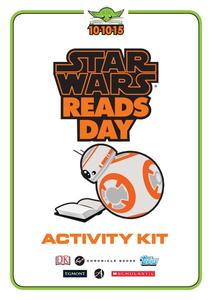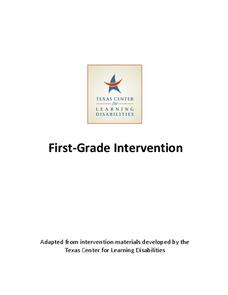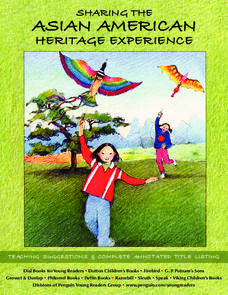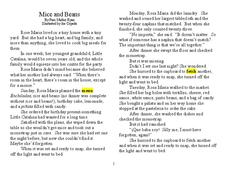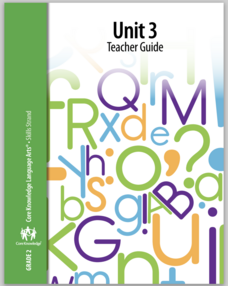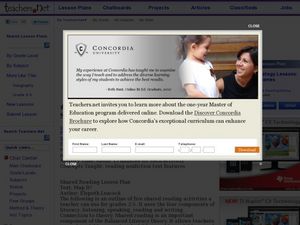Have Fun Teaching
When Am I? (16)
How can you tell when a story takes place? Use context clues to infer the time of day and seasons of five short reading passages. Kids then note each passage's time period as daytime or nighttime, as well as winter or summer.
Curriculum Corner
Sports of All Sorts
Do your students love sports? Do they love math and reading? If the first answer is yes and the second is no, a resource with sports-themed math and literacy games may change their minds! Learners move through stations to practice...
Curated OER
Mapping Out the Story
Discuss the reading comprehension strategy of summarization with your elementary schoolers! They read a chapter from their social studies textbook, Regions Near and Far, and create a map, or word web, for the chapter. They identify...
Curriculum Corner
Literacy Center Plans
When planning for your next learning stations or literacy center activity, use this resource as an outline for what will happen at each center, which students will be involved in each group, and how the small group activities will...
Cloudinary
Star Wars® Reads Day
Calling all Star Wars® fanatics! A set of activity-based worksheets is centered around Star Wars®. From mazes to matching to cutting and coloring, young padawans engage in multiple activities that add a little fun to...
Texas Center for Learning Disabilities
First-Grade Intervention
Learning how to read is a big challenge for young learners, but this series of lessons provides them with the extra support they need to succeed. With each lesson following the a clearly outlined format, children are introduced...
August House
Go to Sleep, Gecko
Use this multidisciplinary lesson to delve into these subjects: English language arts, math, science, drama, and character education. After reading, discussing, and making interpretations about Go To Sleep, Gecko!: A Balinese...
Curated OER
Asian America: Heritage Experience
Learners of all ages read and discuss books about Asian America. In this Asian-America lesson plan, different books for every age group are listed and various teaching strategies are suggested. Great tips cover virtually every grade level!
DePaul University
Working at the Television Station
There's a lot that goes on behind the scenes of a local news program. Read this passage independently or as a whole class to learn about all the different people that work hard to bring us the news. Afterward, young learners determine...
Curated OER
Reading Olympics
Celebrate the joy of reading with activities that center on having fun with books. The teacher creates a variety of "Reading Olympics" categories for the class to compete in, including who can find the longest word, or create the longest...
Mr. Nussbaum
The Color Green
A two-paragraph informative text takes a close look at the color green. Scholars listen to and or read the passage, then answer five multiple-choice questions. A progress report details learners' performance.
Mrs. Mann
Mice and Beans
A great addition to a multicultural unit or curriculum study, use the set of questions based on Pam Muñoz Ryan's Mice and Beans to engage learners and enhance their reading experience. As youngsters read, they...
Core Knowledge Foundation
Second Grade Skills Unit 3: Kids Excel
The unit offers second graders skills practice in tricky spelling and words, grammar—nouns and punctuation, reading decodable texts, and writing a personal narrative. Lessons begin with a warm-up and go into a concept review, word work,...
Florida Center for Reading Research
Phonological Awareness: Phoneme Blending, What's My Word?
At a listening station, learners listen to a pre-recorded script; they follow the directions and number each picture on their picture chart corresponding to the segmented phonemes they hear.
K12 Reader
Using Land in Different Ways
After reading about rural, urban, and suburban land use, readers respond to a series of comprehension questions using evidence from the provided passage.
K12 Reader
What Is a Glyph?
After reading a short passage about glyphs, kids must follow the provided directions to create a star glyph.
Museum of Disability
Don't Call Me Special
Introduce young learners to the idea of disabilities and making friends with children who are different than they are. Using Don't Call Me Special - A First Look at Disability by Pat Thomas, learners are guided through the new...
Florida Center for Reading Research
Sound Changes
Looking for an auditory approach to phoneme manipulation? You'll find everything you need here for an independent practice activity to get youngsters changing initial, medial, and final phonemes to create new words. They begin with a...
Texas Center for Learning Disabilities
Second and Third Grade Explicit Phonics Intervention
Support all young learners on their journey to literacy with this five-lesson reading intervention unit. Following a clearly outlined format, each lesson first engages children in practicing their phonemic awareness and phonics...
August House
The Great Smelly, Slobbery, Small-Tooth Dog
Read the story The Great Smelly, Slobbery, Small-Tooth Dog: A Folktale from Great Britain by Margaret Read MacDonald and choose from multiple activities to learn about the tale's theme—kindness. With so many options, your kind kids will...
Curated OER
Using Social Studies in Five Shared Reading Lessons: Geography
After several short 15-minute mini-lessons, your learners will gain an understanding of the characteristics of a non-fiction text. Using the book Map It by Elspeth Leacock, your class will become acquainted with non-fiction terms...
Weebly
Author Study: Eric Carle
Dive into an author study of one of the most beloved children’s book authors, Eric Carle. After reading some of his stories, including Papa Get me the Moon, A House for Hermit Crab, The Grouchy Ladybug, and The Very Busy...
August House
The Hidden Feast
What is a proverb? This is the leading question of this resource. First, explore proverbs and their meanings. Then, read aloud The Hidden Feast: A Folktale from the American South by Martha Hamilton and Mitch Weiss and partake...
Florida Center for Reading Research
Comprehension: Text Analysis, Persuade, Inform, and Entertain Sort
Why do authors write? Practice determining the author's purpose with a categorizing activity. Learners sort twelve short passages into three categories: persuade, inform, and entertain.






